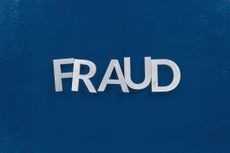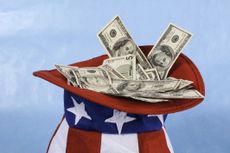New York State Tax Guide
New York state tax rates and rules for income, sales, property, fuel, cigarette, and other taxes that impact residents.


If you live in (or are considering moving to) New York, consider how New York state tax could impact your overall financial burden. New York is known for its high cost of living, and the tax burden plays a significant role in what it costs New Yorkers to live there.
Overall, New York's income tax rates, property taxes, and sales tax make it one of the highest-taxed states in the U.S., but it is not without its perks.
[Data for this state tax guide was gathered from a number of sources including the Census Bureau, the state’s government website, the Sales Tax Handbook, and the Tax Foundation. Property taxes are cited as a rate percentage rather than the assessed value.]

Sign up for Kiplinger’s Free E-Newsletters
Profit and prosper with the best of expert advice on investing, taxes, retirement, personal finance and more - straight to your e-mail.
Profit and prosper with the best of expert advice - straight to your e-mail.
New York state tax: Income taxes

New York has fairly high income tax rates, and New York City's are even higher, ranging from an additional 3.078% to 3.876%. However, the state is generally tax-friendly when it comes to some types of retirement income.
New York tax on retirement benefits: New York does not tax Social Security benefits. Additionally, retirement income from the federal government, New York state and local government, and military retirement plans is tax exempt. Railroad retirement benefits are also tax-exempt.
Note: Taxpayers age 59 1/2 and older can exclude up to $20,000 of federally-taxed income from private retirement plans or government plans from another state.
New York Income Tax Range: Single filers and married filing separately
| Header Cell - Column 0 | Header Cell - Column 1 |
|---|---|
| $8,500 or less | 4% of taxable income |
| $8,501 to $11,700 | $340 plus 4.5% of income over $8,500 |
| $11,701 to $13,900 | $484 plus 5.25% of income over $11,700 |
| $13,901 to $80,650 | $600 plus 5.85% of income over $13,900 |
| $80,651 to $215,400 | $4,504 plus 6.25% of income over $80,650 |
| $215,401 to $1,077,550 | $12,926 plus 6.85% of income over $215,400 |
| $1,077,551 to $5,000,000 | $71,984 plus 9.65% of income over $1,077,550 |
| $5,000,001 to $25,000,000 | $450,500 plus 10.3% of income over $5,000,000 |
| More than $25,000,000 | $2,510,500 plus 10.9% of income over $25,000,000 |
New York Income Tax Range: Married filing jointly
| Row 0 - Cell 0 | Row 0 - Cell 1 |
| $17,150 or less | 4% of taxable income |
| $17,151 to $23,600 | $686 plus 4.5% of income over $17,150 |
| $23,601 to $27,900 | $976 plus 5.25% of income over $23,600 |
| $27,901 to $161,550 | $1,202 plus 5.85% of income over $27,900 |
| $161,551 to $323,200 | $9,021 plus 6.25% of income over $161,550 |
| $323,201 to $2,155,350 | $19,124 plus 6.85% of income over $323,200 |
| $2,155,351 to $5,000,000 | $144,626 plus 9.65% of income over $2,155,350 |
| $5,000,001 to $25,000,000 | $419,135 plus 10.3% of income over $5,000,000 |
| More than $25,000,000 | $2,479,135 plus 10.9% of income over $25,000,000 |
New York Income Tax Range: Head of household
| Row 0 - Cell 0 | Row 0 - Cell 1 |
| $12,800 or less | 4% of taxable income |
| $12,801 to $17,650 | $512 plus 4.5% of income over $12,800 |
| $17,651 to $20,900 | $730 plus 5.25% of income over $17,650 |
| $20,901 to $107,650 | $901 plus 5.85% of income over $20,900 |
| $107,651 to $269,300 | $5,976 plus 6.25% of income over $107,650 |
| $269,301 to $1,616,450 | $16,079 plus 6.85% of income over $269,300 |
| $1,616,451 to $5,000,000 | $108,359 plus 9.65% of income over $1,616,450 |
| $5,000,001 to $25,000,000 | $434,871 plus 10.3% of income over $5,000,000 |
| More than $25,000,000 | $2,494,871 plus 10.9% of income over $25,000,000 |
New York sales tax
The state sales tax rate is 4%, but New Yorkers pay a higher rate since localities can add as much as 4.875%. In the New York City metro area, there is an additional 0.375% sales tax to support transit.
Note: One of the potential perks of living in New York is not having to pay sales tax on things that people in some other states do.
- Groceries are tax-exempt.
- Clothing purchases under $110 are not taxable.
- Prescription drugs are tax-exempt.
- There is no sales tax on diapers.
- New York has banned the "pink tax."
How much are property taxes in New York?

In New York, the median property tax rate is 1.72%, and the average property tax bill is $3,749, making it one of the most expensive in the U.S. Thankfully for adults over age 65, property taxes could cost less.
New York Property Tax Breaks for Retirees
Property tax exemption for adults over age 65: New York law gives local governments and public school districts the option of granting a reduction on the amount of property taxes paid by qualifying adults over age 65 by reducing the assessed value of residential property by 50%. Older adults (aka seniors) over age 65 must meet certain criteria to qualify.
- Must be 65 or older
- Have a maximum income between $3,000 and $50,000 (varies by county, city, town, and school district)
- If income is over $50,000, some property owners may qualify for a partial exemption of between 5% and 20%.
Enhanced STAR program for adults over age 65: The Enhanced STAR program exempts part of a home's value from school property taxes. Adults over age 65 must meet criteria to qualify for the tax break, and the property must be their primary residence.
- Adults must be 65 or older (or turn 65 in the calendar year they apply).
- Cannot have an income above $93,200 (includes income of resident spouses and domestic partners)
New York gas taxes (motor fuel)
Motor vehicle purchases are taxable at state and local sales tax rates, but residents do not need to pay a personal property tax.
Motor fuel taxes average $0.48 but can vary by county. New York motor vehicle tax is among the highest in the country.
New York alcohol and tobacco taxes
| Cigarettes and little cigars | $5.35 per pack ($6.85 in NYC) |
| Snuff | $2 per ounce ($2 for single container if under 1 ounce) |
| Cigars | 75% of wholesale price |
| Vapor products | 20% of retail price |
| Beer | $0.14 per gallon (additional $0.12 in NYC) |
| Wine | $30 per gallon |
| Liquor (more than 24% alcohol by volume) | $6.44 per gallon (additional $1 per gallon in NYC) |
| Liquor (under 24% alcohol by volume) | $2.54 per gallon |
| Marijuana | 13% for personal use |
New York estate and inheritance taxes
There is no inheritance tax in New York, but there is an estate tax. For 2023, estates exceeding $6.58 million are subject to New York's estate tax. Taxable gifts made by the decedent as a New York resident within three years prior to death are included as part of the estate. Tax rates range from 3.06% to 16%.
The New York estate tax is a "tax cliff." That means if the value of the estate is more than 105% of the current exemption, the exemption won't be available, and the entire estate will be subject to state estate tax.
Related Content

Katelyn has more than 6 years’ experience working in tax and finance. While she specializes in tax content, Katelyn has also written for digital publications on topics including insurance, retirement and financial planning and has had financial advice commissioned by national print publications. She believes that knowledge is the key to success and enjoys helping others reach their goals by providing content that educates and informs.
-
 Seven Steps Couples Should Take Before Blending Their Finances
Seven Steps Couples Should Take Before Blending Their FinancesGetting on the same page now can ensure you remain successful throughout your relationship.
By Kiplinger Advisor Collective Published
-
 Charitable Remainder Trust: The Stretch IRA Alternative
Charitable Remainder Trust: The Stretch IRA AlternativeThe SECURE Act killed the stretch IRA, but a properly constructed charitable remainder trust can deliver similar benefits, with some caveats.
By Brandon Mather, CFP®, CEPA, ChFEBC® Published
-
 Retirees Face Significant Tax Bills Due to Fraud
Retirees Face Significant Tax Bills Due to FraudFraud A new report sheds light on how older adult scam victims end up with big tax bills and lost retirement savings.
By Kelley R. Taylor Last updated
-
 Tax Day: Is the Post Office Open Late?
Tax Day: Is the Post Office Open Late?Tax Filing Tax Day means some people need to mail their federal income tax returns.
By Kelley R. Taylor Published
-
 High Earners: Beware of These Illegal Schemes to Lower Taxes
High Earners: Beware of These Illegal Schemes to Lower TaxesTax Schemes The IRS says high-income filers are targets for several illegal tax schemes.
By Katelyn Washington Last updated
-
 Mailing Your Tax Return This Year? What to Know Before You Do
Mailing Your Tax Return This Year? What to Know Before You DoTax Filing There are plenty of reasons not to mail your tax return this year, but here’s what you should know if you are.
By Katelyn Washington Last updated
-
 IRS Warning: Beware of Smishing and 'Helper' Tax Scams
IRS Warning: Beware of Smishing and 'Helper' Tax ScamsScams Tax season is a time to look out for email and text message scams.
By Kelley R. Taylor Last updated
-
 Most Expensive States to Live in for Homeowners
Most Expensive States to Live in for HomeownersProperty Taxes High property tax bills make the places on this list the most expensive states for homeowners to live in.
By Katelyn Washington Last updated
-
 Don’t Miss This $2,500 Tax Break for Paying Your Student Loan
Don’t Miss This $2,500 Tax Break for Paying Your Student LoanTax Deductions Do you qualify for the student loan interest deduction this year?
By Katelyn Washington Last updated
-
 How Much Richer Could You Be Without a Big Tax Refund?
How Much Richer Could You Be Without a Big Tax Refund?Tax Refunds A big tax refund isn’t a reason to celebrate if you overpaid throughout the year. Here’s how much money your interest-free loan to the government could have cost you.
By Katelyn Washington Last updated